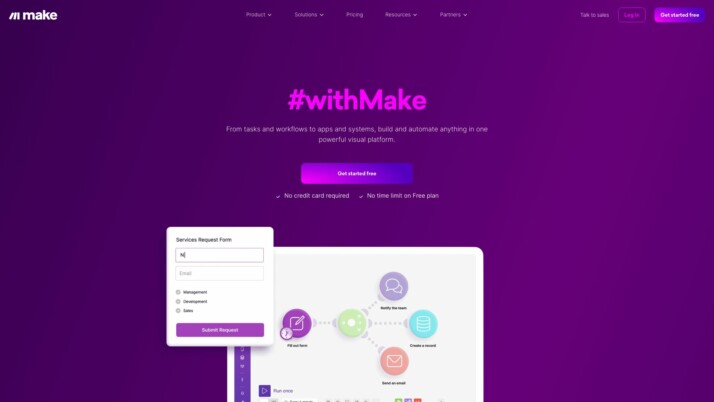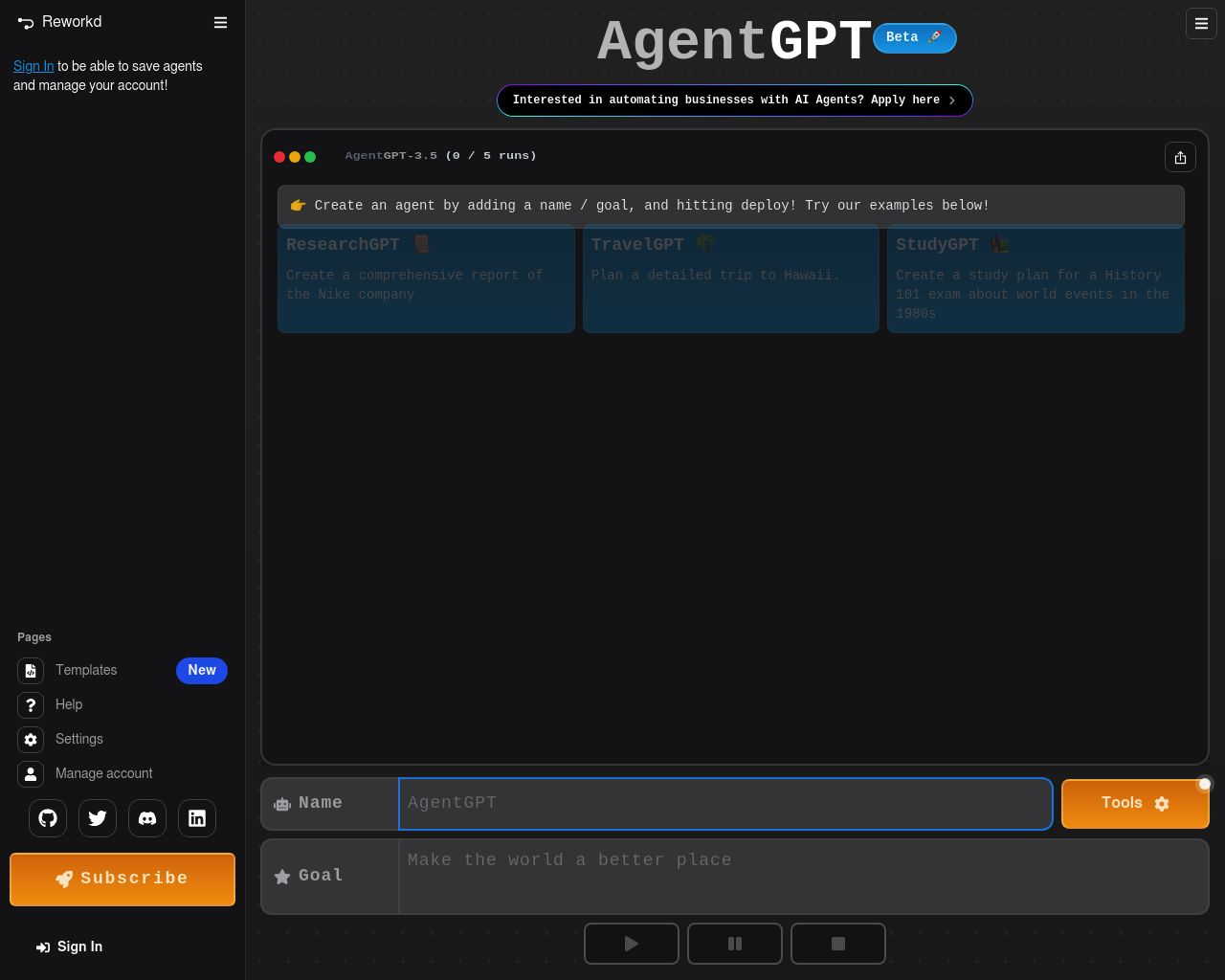Make.com vs. AgentGPT: Comparing AI Automation Platforms
AI-powered automation revolutionizes how businesses operate, but choosing the right platform can be daunting. This comparison of Make.com vs. AgentGPT, and SmythOS illuminates the strengths and limitations of each, helping you select the ideal solution for your needs. Make.com shines in visual workflow creation and app integration, while AgentGPT specializes in autonomous AI agents for goal-oriented tasks.
SmythOS, however, emerges as the comprehensive solution, combining powerful workflow automation with cutting-edge AI capabilities. Whether you’re a developer seeking advanced API integrations, a business leader focused on scalability and security, or a non-technical user looking for accessible AI tools, this analysis provides the insights you need to make an informed decision.
Make.com Overview
Make.com provides a powerful visual platform for workflow automation and app integration. The intuitive drag-and-drop interface allows users to create complex workflows, called scenarios, without coding. Make.com connects over 1,000 popular apps and services, enabling businesses to automate repetitive tasks and streamline operations.


Make.com provides a powerful visual platform for workflow automation and app integration. The intuitive drag-and-drop interface allows users to create complex workflows … without coding.
The platform excels at data manipulation, error handling, and conditional logic implementation. Users can schedule scenarios to run automatically, transforming manual processes into efficient automated workflows. Make.com’s execution logs offer transparency, allowing teams to analyze and optimize every step.
While Make.com lacks AI agent capabilities, it compensates with robust integration options and scalability. The platform supports multiple teams and roles, facilitating collaborative work on automation projects. Security features include OAuth authentication and compliance with information security standards.
Make.com’s limitations include the absence of AI-specific functions like autonomous agents or foundation AI models. However, its strength lies in connecting existing tools and automating business processes across various applications. The platform scales from individual users to enterprise solutions, making it versatile for different business sizes and automation needs.
AgentGPT Overview
AgentGPT empowers users to create and deploy autonomous AI agents directly in a web environment. Unlike traditional chatbots, AgentGPT focuses on achieving broad, goal-oriented tasks. The platform’s web-based interface sets it apart from locally-operated alternatives, offering a more accessible solution for users across various technical backgrounds.


AgentGPT boasts a robust feature set, including user authentication, agent run saving and sharing, dynamic translations, and AI model customization. The platform’s web browsing capabilities expand its utility, while backend migration to Python and Stripe integration enhance its performance and accessibility. These features make AgentGPT a versatile tool suitable for both simple tasks and complex operations.
AgentGPT empowers users to create and deploy autonomous AI agents directly in a web environment. Unlike traditional chatbots, AgentGPT focuses on achieving broad, goal-oriented tasks.
A standout feature of AgentGPT is its use of vector databases for memory management. This technology allows AI agents to retain execution history and access long-term memory, significantly enhancing their functionality over extended periods. The platform’s cloud offering scales efficiently, integrating seamlessly with tools like LangChain to provide a comprehensive solution for AI agent deployment.
Despite its strengths, AgentGPT faces challenges common to emerging AI platforms. The complexity of integrating AI agents into existing systems may pose difficulties for some users. Additionally, as with many AI tools, concerns about data privacy and security require careful consideration. Users should also be aware of potential limitations in customization options, which may affect the development of highly specialized agents.
AgentGPT’s vision centers on empowering individuals and businesses by providing tools that streamline operations, boost efficiency, and enable informed decision-making. The platform’s commitment to making advanced technology accessible fosters innovation and enhances collaboration. As AgentGPT continues to evolve with contributions from its user community, it reflects a collaborative and inclusive approach to AI development, positioning itself as a significant player in the rapidly advancing field of AI agent builders.
Feature Comparison
Make.com and AgentGPT offer contrasting approaches to workflow automation and AI deployment. Make.com excels in visual workflow creation and app integration, while AgentGPT focuses on autonomous AI agents for goal-oriented tasks.
Make.com provides a robust no-code visual builder for connecting over 1,000 apps and services. It offers powerful data manipulation, error handling, and conditional logic tools. However, Make.com lacks AI-specific capabilities like autonomous agents or foundation AI models. AgentGPT, conversely, specializes in deploying customizable AI agents in a web environment. It utilizes vector databases for agent memory management, enhancing functionality over time.
Security features also differ significantly. Make.com ensures information security compliance and supports OAuth authentication. AgentGPT’s security measures are less clearly defined in available documentation. Make.com’s enterprise-grade scalability contrasts with AgentGPT’s focus on individual users and smaller teams. While both platforms aim to simplify complex processes, they cater to different user needs and technical requirements.
Feature Comparison Table
| Make.com | AgentGPT | SmythOS | |
|---|---|---|---|
| CORE FEATURES | |||
| AI Agents | ❌ | ✅ | ✅ |
| Hosted Agents (Dev, Production) | ❌ | ✅ | ✅ |
| Environments (Dev, Production) | ❌ | ✅ | ✅ |
| Visual Builder | ✅ | ❌ | ✅ |
| No-Code Options | ✅ | ❌ | ✅ |
| Memory & Context | ❌ | ✅ | ✅ |
| Autonomous Agents | ❌ | ✅ | ✅ |
| Explainability & Transparency | ❌ | ❌ | ✅ |
| Multimodal | ❌ | ✅ | ✅ |
| Problem-Solving Capabilities | ❌ | ✅ | ✅ |
| Multi-Agent Collaboration | ❌ | ✅ | ✅ |
| Human-AI Interaction | ❌ | ❌ | ✅ |
| SECURITY | |||
| Constrained Alignment | ❌ | ❌ | ✅ |
| Data Encryption | ❌ | ✅ | ✅ |
| IP Control | ❌ | ❌ | ✅ |
| COMPONENTS | |||
| Foundation AIs | ❌ | ❌ | ✅ |
| Huggingface AIs | ❌ | ✅ | ✅ |
| Zapier APIs | ❌ | ✅ | ✅ |
| Classifiers | ❌ | ✅ | ✅ |
| Data Lakes | ❌ | ❌ | ✅ |
| DEPLOYMENT OPTIONS (EMBODIMENTS) | |||
| Deploy as API | ❌ | ✅ | ✅ |
| Staging Domains | ❌ | ❌ | ✅ |
| Production Domains | ❌ | ❌ | ✅ |
| Deploy as Site Chat | ❌ | ✅ | ✅ |
| Deploy as Scheduled Agent | ✅ | ❌ | ✅ |
| DATA LAKE SUPPORT | |||
| Hosted Vector Database | ❌ | ✅ | ✅ |
| Sitemap Crawler | ❌ | ❌ | ✅ |
| YouTube Transcript Crawler | ❌ | ❌ | ✅ |
| URL Crawler | ❌ | ✅ | ✅ |
| PDF Support | ❌ | ✅ | ✅ |
| Word File Support | ❌ | ✅ | ✅ |
| TXT File Support | ❌ | ✅ | ✅ |
Best Alternative to Make.com and AgentGPT
SmythOS stands out as the superior alternative to Make.com and AgentGPT, offering a comprehensive AI automation platform that combines ease of use with powerful features. Our drag-and-drop interface simplifies the creation of complex AI workflows, making advanced AI capabilities accessible to users of all skill levels.
Unlike Make.com’s focus on app integration or AgentGPT’s emphasis on autonomous agents, SmythOS provides a versatile ecosystem for building, deploying, and managing AI agents across various use cases. We offer pre-built API integrations, support for multiple AI models, and the ability to create multi-agent systems that collaborate on complex tasks.
SmythOS excels in areas where Make.com and AgentGPT fall short. While Make.com lacks AI-specific capabilities and AgentGPT offers limited customization, we provide a robust set of AI tools alongside extensive customization options.
SmythOS excels in areas where Make.com and AgentGPT fall short. While Make.com lacks AI-specific capabilities and AgentGPT offers limited customization, we provide a robust set of AI tools alongside extensive customization options. Our platform supports autonomous agents with advanced memory and context management, features absent in Make.com and more developed than those in AgentGPT.
Security and scalability set SmythOS apart. We implement strong data encryption, OAuth authentication, and IP control features, addressing enterprise-level security concerns that AgentGPT’s documentation doesn’t clearly define. Our platform scales effortlessly from individual projects to large-scale enterprise deployments, offering flexibility that Make.com and AgentGPT struggle to match.
By choosing SmythOS, users gain access to a comprehensive AI development environment that combines the best of both worlds — the intuitive workflow creation of Make.com and the AI agent capabilities of AgentGPT — while offering unique features like multimodal support, problem-solving capabilities, and seamless deployment options. SmythOS empowers users to harness the full potential of AI, driving innovation and efficiency across industries.
Conclusion
Make.com, AgentGPT, and SmythOS each offer unique approaches to workflow automation and AI deployment. Make.com excels in visual workflow creation and app integration, while AgentGPT specializes in autonomous AI agents for goal-oriented tasks. However, SmythOS emerges as the superior choice, combining the strengths of both platforms and offering additional cutting-edge features.
SmythOS stands out with its comprehensive AI agent creation and deployment capabilities. Our platform’s intuitive drag-and-drop interface rivals Make.com’s ease of use, while our support for autonomous agents matches and exceeds AgentGPT’s offerings. SmythOS goes further by providing multi-agent collaboration, advanced debugging tools, and seamless integration with over 300,000 APIs and services.
Unlike Make.com’s lack of AI-specific functions or AgentGPT’s limitations in customization, SmythOS offers a full spectrum of AI capabilities. We support various foundation models, enable multimodal interactions, and provide robust tools for problem-solving and data manipulation. Our platform also addresses enterprise needs with scalable solutions, strong security measures, and flexible deployment options.
To experience the future of AI automation and integration, create a free SmythOS account today. Explore our extensive library of AI agent templates to jumpstart your projects, or dive into our comprehensive documentation to unlock the full potential of SmythOS. Join us in revolutionizing workflows and driving innovation across industries with SmythOS – where creating and deploying AI agents is 99% faster and more accessible than ever before.
Last updated:
Disclaimer: The information presented in this article is for general informational purposes only and is provided as is. While we strive to keep the content up-to-date and accurate, we make no representations or warranties of any kind, express or implied, about the completeness, accuracy, reliability, suitability, or availability of the information contained in this article.
Any reliance you place on such information is strictly at your own risk. We reserve the right to make additions, deletions, or modifications to the contents of this article at any time without prior notice.
In no event will we be liable for any loss or damage including without limitation, indirect or consequential loss or damage, or any loss or damage whatsoever arising from loss of data, profits, or any other loss not specified herein arising out of, or in connection with, the use of this article.
Despite our best efforts, this article may contain oversights, errors, or omissions. If you notice any inaccuracies or have concerns about the content, please report them through our content feedback form. Your input helps us maintain the quality and reliability of our information.
